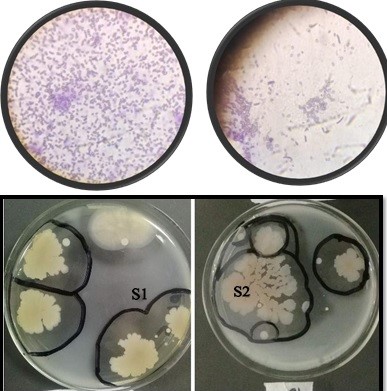Production of Extracellular Protease from Bacterial Co-cultures using Solid State Fermentation
Abstract
 Abstract Views: 251
Abstract Views: 251
Proteases (also known as peptidases or proteinases) are hydrolytic enzymes that cleave proteins into amino acids. They comprise 60% of the total industrial usage of enzymes worldwide and can be obtained from many sources. The current study aims to isolate and screen protease-producing bacterial strains from the soil and to produce protease from the bacterial co-cultures using solid-state fermentation (SSF). Primary screening of the protease-producing bacterial strains was carried out on skim milk agar and they were sub-cultured and preserved on the nutrient agar for further testing. Thirty-two compatibility tests of twenty-seven bacterial isolates were performed and SSF was carried out. Afterward, absorbance was taken at 660 nm against tyrosine as standard. According to the results, the bacterial co-culture 19 showed the highest absorbance with an enzyme activity of 10.2 U/ml. The bacterial strains of the co-culture 19 were identified through morphological and biochemical tests. Bacterial strain 1 was observed as cocci and irregular, while bacterial strain 2 was bacillus and rod-shaped. Both strains were positive for gram staining, catalase test, casein hydrolysis test and methyl red test. As for endospore staining, bacterial strain 1 was spore forming while bacterial strain 2 was a non-spore former. It was concluded that the bacterial co-culture 19 can act as a potent co-culture for protease production. Compatibility test was carried out to enhance the production of protease by utilizing cheap and readily available agro-waste products, which benefit the industry by being cost effective and the environment by being eco-friendly.
Copyright (c) The Authors
Downloads
References
Ali S, MuhammadFG. Industrial Applications of Microbial Proteases. European J PharmaMedRes. 2017;4(6):623-629.
Rengaraj A.Isolation and optimization of protease-producing bacteria from a soil sample. Global J Eng Appl Sci. 2012;2:2249-26232.
Demain AL, Adrio JL. Contributions of microorganisms to industrial biology. Mol Biotechnol. 2008 Jan; 38(1):41-55.
Hamza TA, Woldesenbet F. Optimization of culture growth parameters for production of protease from bacteria, isolated from soil. Biosci Bioeng. 2017;3:1-0.
SundusH, Mukhtar H, Nawaz A. Industrial applications and production sources of serine alkaline proteases: a review. JBacteriol Mycol. Open Acces. 2016;3(1):191-4.
Nisha NS, Divakaran J. Optimization of alkaline protease production from Bacillus subtilis NS isolated from sea water. African J Biotechnol. 2014;13(16):1707-1713.
Singh S, Bajaj BK. Bioprocess optimization for production of thermoalkali-stable protease from Bacillus subtilis K-1 under solid-state fermentation. Preparative Biochem Biotechnol. 2016 Oct 2;46(7):717-24. https://doi.org/10.1080/10826068.2015.1135455
Rupali D. Screening and isolation of protease producing bacteria from soil collected fromdifferent areas of Burhanpur Region (MP) India. Int J Curr Microbiol App Sci. 2015; 4(8):597-606.
Kuberan T, Sangaralingam S, Thirumalai Arasu V. Isolation and optimization of protease producing bacteria from halophilic soil. J Biosci Res.2010;1(3):163-74.
Dorcas K, Roy VV.Screening and identification of protease producing bacteria from soil. Acta Biological Indica. 2012;1(2):198-206.
Hamza TA. Bacterial protease enzyme: Safe and good alternative for industrial and commercial use. Int J Chem Biomol Sci.2017;3(1):1-0. https://pdfs.semanticscholar.org/7943/ad6326fc6577937dcd4dc74a3c2601b3c70a.pdf
Hamza TA. Isolation and characterization of protease producing bacteria from soil, in Arba Minch University, Abaya Campus. Am J Bio Environ Stat. 2018 Jan 15;4(1):10-4.
Palsaniya P, Mishra R, Beejawat N, et al. Optimization of alkaline protease production from bacteria isolated from soil. J Microbiol Biotechnol Res. 2012;2(6):695-701.
Vakilwala M, Patel D.Isolation and screening of protease producing organisms from soil sample. Int J Res Sci Innovation. 2017;4(4):75-78.
Priya V, Preethi S, Karthikeyan S, et al. Isolation and identification of protease producing bacteria from soil. Int J Res Eng Tech. 2016;3(8):1362-5.
Harish R, Chauhan BJ. Isolation, characterization of protease producing microbes from soil of agriculture land and purification of protease. Int JPharma Res Health Sci. 2017;5(1):1581-5.

Copyright (c) 2020 Nabiha Naeem Sheikhs, Qurat-ul-ain, Saba Altaf

This work is licensed under a Creative Commons Attribution 4.0 International License.
BSR follows an open-access publishing policy and full text of all published articles is available free, immediately upon publication of an issue. The journal’s contents are published and distributed under the terms of the Creative Commons Attribution 4.0 International (CC-BY 4.0) license. Thus, the work submitted to the journal implies that it is original, unpublished work of the authors (neither published previously nor accepted/under consideration for publication elsewhere). On acceptance of a manuscript for publication, a corresponding author on the behalf of all co-authors of the manuscript will sign and submit a completed the Copyright and Author Consent Form.










